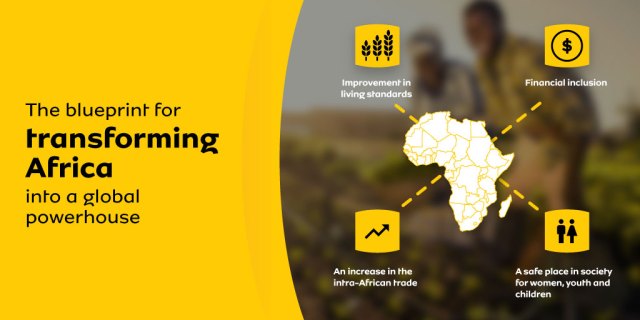
- Home
- About Us
- Sustainability
- Investors
- News
- People & Culture
-
Regions
We live in an era where change is demanded. The digital world has played a big role in bringing the inequalities of the physical world to light. Thanks to technology, we are more aware of the state of different parts of the world than ever before. Technology eliminates the excuse of ignorance and provides us with some of the tools needed to address inequality. Consider the role technology can play in achieving the African Union’s 2063 Transformational Outcomes. The AU describes Agenda 2063 as Africa’s blueprint for transforming Africa into the global powerhouse of the future. Access to a connected world can make a positive impact on the achievement of these outcomes.
First on the agenda is an overall improvement in living standards for people in Africa. This includes reducing poverty and hunger, providing access to basic education and health, as well as access to basic requirements like safe drinking water and electricity.
The role technology plays here is one of job opportunities. A digital world provides a set of job opportunities and revenue streams which did not exist just a few years ago. With more youth coding for their futures (note: link to youth coding article) and taking an entrepreneurial path in their careers, more jobs are created for people living in Africa.
“When stories in the digital world lead to action in the physical world, it shows just how good people and technology can be together.”
Financial inclusion is necessary for a country’s economy to thrive. Without access to financial services, people cannot easily participate in the economy. The AU goal in this case includes the aim of ICT penetration contributing to GDP, at double the rate it did in 2013.
Mobile Money has proven itself to be the solution for financial inclusion in Africa. On our continent, people are more likely to have a cell phone than they are to have a traditional bank account. Mobile Money takes a digital approach to finance, filling the gap where traditional banking alienates millions of people in Africa.
 Integrated Africa
Integrated AfricaThe AU lists several desired outcomes in its aim for an integrated Africa. This includes free movement of goods and people on the continent, an increase in the volume of intra-African trade, upgraded transport and infrastructure as well as an improved education system.
As more areas within the continent become connected, goals such as this one become more realistic. Communication is already easier thanks to the popularity of mobile phones in Africa, which makes it more practical to move goods across the continent. As more Internet of Things solutions are deployed across the continent for various applications, more opportunities for efficiency and cost saving become apparent. With a reliable internet connection, building and deploying IoT solutions is a realistic (and profitable) way to solve challenges which are unique to Africa.
Technology provides us with a platform to share our stories, giving everyone who is connected a voice which the whole world can hear. The current state of the world is one where equality is no longer tolerated, and action can be taken to ensure that women, youth and children have a safe place in society.
Whether stories are produced by a journalist or by a person directly involved in it, that story has the potential to reach millions. The internet is a place where anyone can share their experiences, ask for help and do the research. When stories in the digital world lead to action in the physical world, it shows just how good people and technology can be together.
Perhaps the AU’s most detailed desired outcome for 2063, connectivity has a role to play in each part of it. This includes a 60% increase in local content in print and digital media, an increase in focus on the creative arts, and even the establishment of an African Space Agency.
While we provide coverage to over 560 million people in Africa, there is still so much room for growth. As we increase coverage in the regions where we operate, the opportunities to achieve these goals becomes much more realistic. Whether increasing digital media or taking African people to space, connectivity is imperative to achieving these goals.